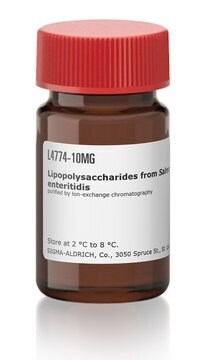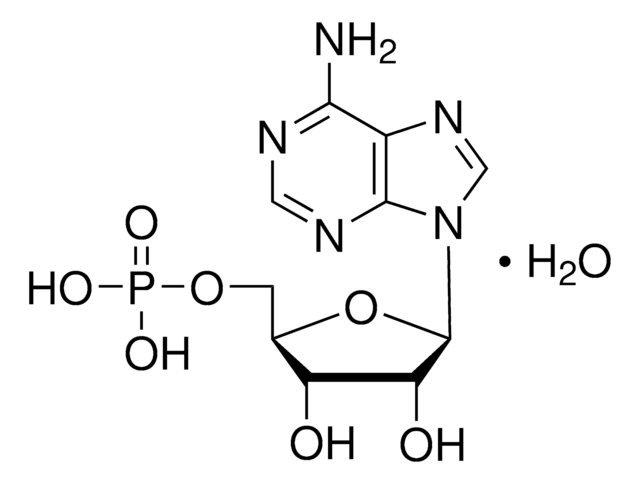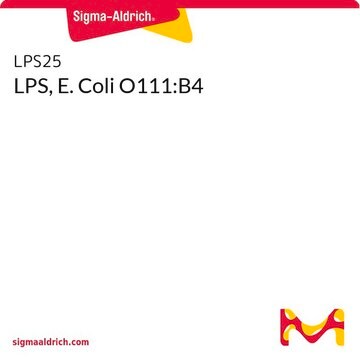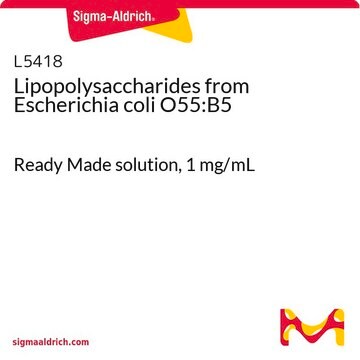T3382
Lipopolysaccharides from Escherichia coli O111:B4
trinitrophenyl conjugate
Synonym(s):
LPS
Sign Into View Organizational & Contract Pricing
All Photos(1)
About This Item
Recommended Products
biological source
Escherichia coli (O111:B4)
conjugate
trinitrophenyl conjugate
form
lyophilized powder
extent of labeling
10-60 μg trinitrophenol per mg LPS
shipped in
ambient
storage temp.
2-8°C
Looking for similar products? Visit Product Comparison Guide
Application
Lipopolysaccharides (LPSs) are characteristic components of the cell wall of Gram-negative bacteria. LPS and its lipid A moiety stimulate cells of the innate immune system by the Toll-like receptor 4 (TLR4), a member of the Toll-like receptor protein family, which recognizes common pathogen-associated molecular-patterns (PAMPs).
Signal Word
Danger
Hazard Statements
Precautionary Statements
Hazard Classifications
Acute Tox. 2 Oral
Storage Class Code
6.1A - Combustible acute toxic Cat. 1 and 2 / very toxic hazardous materials
WGK
WGK 3
Flash Point(F)
Not applicable
Flash Point(C)
Not applicable
Personal Protective Equipment
dust mask type N95 (US), Eyeshields, Gloves
Choose from one of the most recent versions:
Already Own This Product?
Find documentation for the products that you have recently purchased in the Document Library.
Customers Also Viewed
Katherine E Wickliffe et al.
Cellular microbiology, 10(6), 1352-1362 (2008-02-13)
Macrophages from certain inbred mouse strains are rapidly killed (< 90 min) by anthrax lethal toxin (LT). LT cleaves cytoplasmic MEK proteins at 20 min and induces caspase-1 activation in sensitive macrophages at 50-60 min, but the mechanism of LT-induced
Marcus Mühlbauer et al.
Immunology, 124(2), 256-264 (2008-02-21)
Epididymitis represents a serious threat to male fertility and usually develops following secondary bacterial infection of the epididymis such as urinary tract infections or sexually transmitted diseases. Surprisingly, very little is known about the innate host response triggered by bacterial
Zhenju Song et al.
Critical care (London, England), 15(1), R12-R12 (2011-01-12)
Deregulated or excessive host immune responses contribute to the pathogenesis of sepsis. Toll-like receptor (TLR) signaling pathways and their negative regulators play a pivotal role in the modulation of host immune responses and the development of sepsis. The objective of
Systemic but not local infections elicit immunosuppressive IL-10 production by natural killer cells.
Georgia Perona-Wright et al.
Cell host & microbe, 6(6), 503-512 (2009-12-17)
Surviving infection represents a balance between the proinflammatory responses needed to eliminate the pathogen, and anti-inflammatory signals limiting damage to the host. IL-10 is a potent immunosuppressive cytokine whose impact is determined by the timing and localization of release. We
Nathalie Busso et al.
PloS one, 3(5), e2267-e2267 (2008-05-22)
Nicotinamide phosphoribosyltransferase (NAMPT), also known as visfatin, is the rate-limiting enzyme in the salvage pathway of NAD biosynthesis from nicotinamide. Since its expression is upregulated during inflammation, NAMPT represents a novel clinical biomarker in acute lung injury, rheumatoid arthritis, and
Our team of scientists has experience in all areas of research including Life Science, Material Science, Chemical Synthesis, Chromatography, Analytical and many others.
Contact Technical Service






